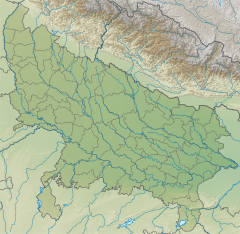The Varuna River is a minor tributary of the Ganges River in Uttar Pradesh, India. It originates at Phulpur in the Prayagraj district and merges into the Ganges near Sarai Mohana in the Varanasi district.[1] The 6 kilometres (3.7 mi) stretch between Sarai Mohana and Sadar, Varanasi, Uttar Pradesh is prone to flooding.[2] The name 'Varanasi' is originated from the name of two rivers, Varuna and Assi.
| Varuna River | |
|---|---|
 | |
| Location | |
| Country | |
| State | Uttar Pradesh |
| Physical characteristics | |
| Mouth | Ganges |
• location | Adikeshav Ghat, Sarai Mohana, Varanasi district, Uttar Pradesh |
• coordinates | 25°19′44″N 83°02′38″E / 25.329°N 83.044°E |
| Length | 202 km (126 mi) |
According to the Vamana Purana, the river was created by the gods alongside the Assi River. It is also mentioned in the Mahabharata.[1]
Varuna derives its name from Varuna, a Hindu god who is associated with sky, oceans and water. The river originates from Melhum at Phulpur in Prayagraj district. Spanning a distance of around 100 kilometers, it flows in an east to southeast direction before merging with the Ganges at Sarai Mohana near Varanasi.[1]
It covers a distance of twelve kilometers from the western part of Jaunpur district, near the town of Mungerabad Shahpur, and eventually joins the Ganga River in Varanasi after a journey of 202 kilometers.[3]
In February 2023, Denmark and Uttar Pradesh government signed a Rs 1,000 crore MoU for cleaning the Ganga River and its tributary, Varuna.[4]
References
edit- ^ a b c "VDA: Source of salvation languishing in neglect". The Times of India. 18 December 2012. Archived from the original on 14 July 2024. Retrieved 12 October 2019.
- ^ "Flood situation grim in UP, 3,000 moved to camps". The Times of India. 21 August 2016. Archived from the original on 2 November 2019. Retrieved 12 October 2019.
- ^ "तीन जिलों की सरहद से वरुणा का उद्गम". Jagran. 28 May 2013. Archived from the original on 14 December 2024. Retrieved 17 December 2024.
- ^ "MoU with Denmark for lab in Varanasi to ensure clean Ganga". The Statesman. 10 February 2023. Archived from the original on 14 December 2024. Retrieved 17 December 2024.
